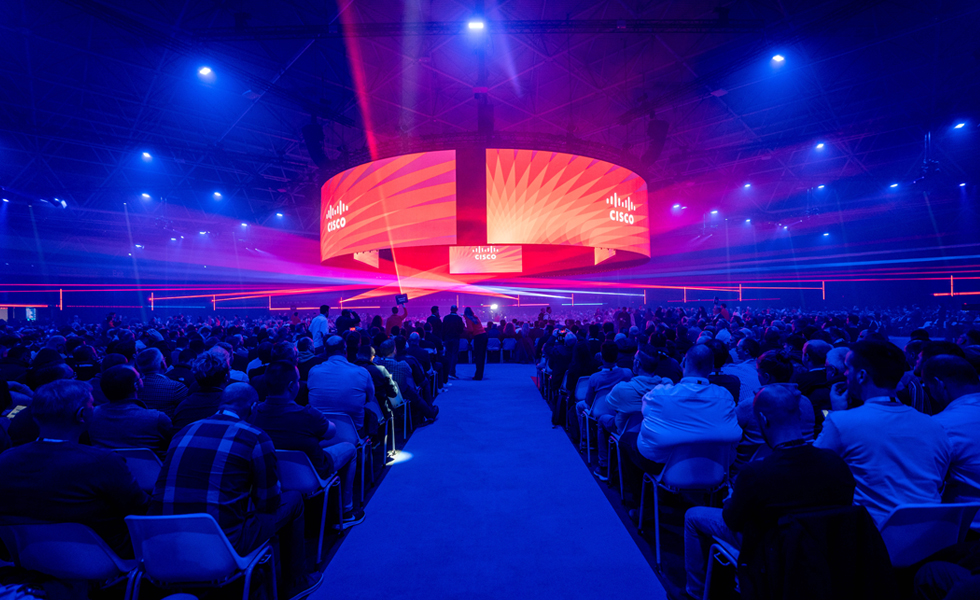Over the past few years, enterprise event technology has evolved from a nice-to-have solution for streaming events to a must-have tool for creating engagement-rich hybrid experiences. In addition, the rise of digitized events allowed organizers to capture deeper audience insights, facilitate more meaningful connections, and reach larger audiences than ever before.
Even outside of work, digital experiences have become more sophisticated. Engaging with content is more interactive, often bridging the gap between virtual and in-person audiences through technology. The new digital era also provides people with more flexible ways to participate and personalize interactions.
Enterprises that embrace the era of digitized events will be able to provide audiences with more valuable experiences while capturing data-rich insights to improve their ROI.
Improve attendee experiences with digitized events
The days of navigating a conference with a crumpled agenda and filling pockets with stacks of business cards are over. Bringing digital components into in-person events can dramatically enhance attendee experiences. Implementing an event app helps provide easy access to must-have information including floor plans and agendas – all in one place. Providing attendee networking for hybrid events as part of the in-app experience to enable in-person and virtual connections.
While in-person events have made a comeback, virtual experiences remain a valuable way for enterprises to stay connected to their customers and prospects year-round.
According to IDC’’s 2022 Annual Conferencing and Collaboration Survey, 99% of all knowledge workers planned to attend at least one virtual event in the next year, with nearly half attending more than six virtual events in the same time period. (1)
A modern enterprise events program offers customers, prospects, and sponsors flexibility in how they attend events. By delivering both virtual and in-person experiences, businesses can engage with attendees multiple times throughout the year, providing more opportunities for rich data collection through a single event platform.
With a unified event management solution that powers the entire event lifecycle including event registration, real-time Q&A, and on-demand content, enterprises no longer have to piece together disparate solutions. An all-in-one platform brings each component of the event tech under one roof, simplifying setup and data management.
Now’s the time for event organizers to invest in event tech that’s flexible, scalable, and easy to use for both their teams and attendees.
Always-on communities offer year-round engagement
To help nurture engagement between events, virtual, always-on communities provide yet another space for a company’s audience to engage with each other, sponsors, and their content. These communities often increase attendance and levels of engagement for future events and create engaged customers and prospects year-round.
If a brand doesn’t offer a digital community, the data suggests that more than half of the attendees will find or create a community themselves, according to The IDC Spotlight, sponsored by Webex Events (formerly Socio), The Future of Enterprise Events: Maximizing Growth in the Digital Age (2)
The Webex Events Community Platform provides a space for attendees to connect, network, and access on-demand content. By creating and facilitating a community, businesses can identify topics that resonate with their audience and use the information to inform content for their year-round modern events program.
First-party data personalizes event offerings
The days of relying on web browser cookies to identify customers are quickly waning. Organizations need first-party data if they want to continue communicating with their prospects and customers.
The attendee data available in an event management solution provides enterprises with the foundation needed to deliver personalized attendee experiences.
With pre-event registration, enterprise teams can ask attendees specific questions about which topics they’re interested in or what pain points they’re looking to solve by attending the event. This data can then be used to craft the event’s session or keynote content.
Once attendees access content in the event platform, businesses can collect data from real-time polls and Q&A. This data can be used to help inform post-event follow-ups and future event programming.
Purpose-built event solutions engage attendees
In order to capture data, engage attendees, provide communities, and recruit sponsors, companies often stitch together multiple-point solutions. This leads to a disjointed customer experience, a series of data silos, and a headache for the event organizers who have to manage all the different vendors and contracts.
Leveraging an end-to-end event management platform like Webex Events drives a seamless attendee journey from registration to event production, and even for post-event engagement and communities. And for the business utilizing the platform, it provides the power, customization, and security enterprises require.
Digital era of events expands reach and expectations
It’s time for companies to throw out the old events playbook. The changing business climate and rapid technology evolution presents enterprises with a unique opportunity to engage customers and prospects through virtual and in-person events. By leveraging a unified event management platform to engage attendees and drive sponsor ROI, companies can achieve significant, long-term event benefits in the new digital era.
For more on the future of enterprise events in the digital age, download the full report, The IDC Spotlight, sponsored by Webex Events (formerly Socio), The Future of Enterprise Events: Maximizing Growth in the Digital Age (doc #US50485423, March 2023).
(1) (Source: IDC’s 2022 Annual Conferencing and Collaboration Survey, IDC #US47735922, November 2022).
(2) (Source: IDC’s The Future of Enterprise Events: Maximizing Growth in the Digital Age 1 (doc #US50485423, March 2023).
Related Posts:





